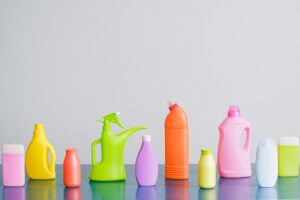 The use of phosphate-based detergents leads to the algal blooms of lakes and rivers. Household chemicals can also cause health problems, for example, if you use chlorine products indoors, it can irritate the nasopharynx and have a toxic effect on the respiratory tract.
The use of phosphate-based detergents leads to the algal blooms of lakes and rivers. Household chemicals can also cause health problems, for example, if you use chlorine products indoors, it can irritate the nasopharynx and have a toxic effect on the respiratory tract.
Household chemistry is harmful to the environment
Chemicals in dishwashing, washing and cleaning products upset the ecosystem. Many detergents contain phosphates. When phosphates enter water bodies, they accelerate the growth of blue-green algae and this leads to the flowering of rivers.
Flowering is dangerous because algae do not get enough sunlight and oxygen. Water quality deteriorates. Also, these algae emit toxic substances that disrupt the development and normal functioning of fish and other river dwellers.
Household chemistry can harm health
Any household chemicals that enter the market are toxicologically certified and should not cause problems if used properly. But it can be harmful if not used as directed and in the wrong doses. The level of toxicity depends on the quantity.
Problems with the use of household chemicals can be different: from skin problems to irritation of the mucous membranes of the respiratory tract and gastrointestinal tract. They can occur if you inhale these products in high concentrations.
Detergents also contain chemicals that can affect health in large quantities. For example, washing powders contain enzymes: cations or anions that remove stains and dirt. Cationic detergents are the most toxic to the body. Ingestion may cause nausea, vomiting, shock, and convulsions. Anionic detergents are less toxic but can irritate the skin and eyes.
If a person is exposed to a large number of detergents, they can get asthma. These products are also responsible for a large number of household poisonings.
The use of chlorine-containing products indoors can cause a variety of problems: from irritation of the nasopharynx to toxic effects through the respiratory tract.
If a person has an intolerance to any chemical compound, then systemic inhalation of these compounds in high concentrations can cause allergic reactions. This is not only a rash on the skin but also shortness of breath or swelling of the airways.
There are many universal cleaners on the market. Among the substances that are part of them: are phosphate, ammonia, and sodium hypochlorite. Depending on the composition, universal cleansers can irritate the skin, eyes, nose, and throat. When ingested, they can cause poisoning in both humans and animals.
How to avoid the negative effect of detergents
It is important to use household chemicals according to the instructions, to avoid getting inside the body, skin contact, and keep away from children as possible.
- Barrier protection methods should be worn: gloves or respirators.
- Wash your hands and wash your skin with plenty of water after using household chemicals.
- When cleaning, there must be good air circulation in the room, so you should open the windows for ventilation.
How to choose a safe alternative
Don’t buy flavored products, because we do not inhale the smell of chamomile or lemon, but chemical compounds that can affect our health.
Some brands use greenwashing and simply add the words “bio”, and “eco” or put the product in a green package. So you should first look at the composition of the tool.
You should avoid products with:
- phosphates;
- chlorine;
- microplastic;
- fragrances.
Use ecological detergents
It is believed that we live in an environment of dangerous microorganisms, so we buy products, that promise to kill 99% of bacteria. In fact, most bacteria are not that dangerous.
It is not necessary to disinfect surfaces for cleaning at home, there will be enough soap solution, which will perfectly handle dirt. You can use ordinary natural soap, which can be bought online or in eco-shops. It usually does not contain fragrances and is safe for the skin and the environment.
Picture Credit: Pexels
